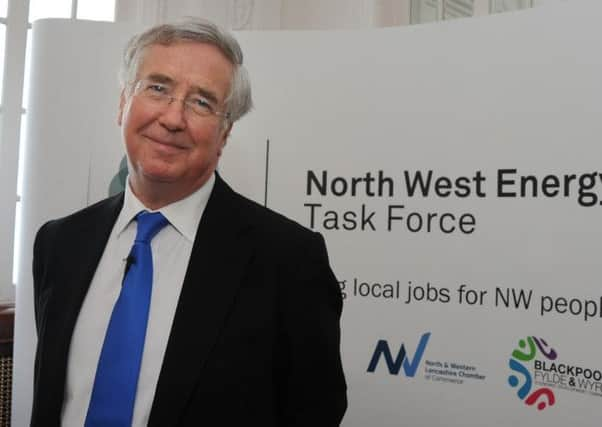Fracking safeguards revealed
This article contains affiliate links. We may earn a small commission on items purchased through this article, but that does not affect our editorial judgement.


Ministers have adopted experts’ advice to try to allay Lancashire residents’ fears about the prospect of an earthquake or environmental pollution as a result of “fracking”.
The revelations came as delegates gathered at the North West shale gas supply chain conference at the Winter Gardens, Blackpool.
Advertisement
Hide AdAdvertisement
Hide AdAt the conference, energy minister Michael Fallon urged the Lancashire community to get behind shale gas as latest estimates said fracking could be worth £33bn to the UK economy, creating 64,500 jobs over 15 years.
Cuadrilla is about to apply for permission to drill for shale gas at two sites near Preston.
The process involves injecting water at a very high pressure into the ground to allow the gas to be released.
Opponents claim hydraulic fracturing can cause earth tremors and pollute the water supply. There are also fears about the effect on the environment and massive traffic movement to and from sites.
Advertisement
Hide AdAdvertisement
Hide AdBut an Ernst & Young study into shale gas, commissioned by the UK Onshore Operators Group, says the industry could be worth billions.
The Department of Energy and Climate Change is set to adopt a series of safety and regulation initiatives for the shale gas industry.
Mr Fallon announced £2m funding for research into safety and efficiency initiatives, and the introduction of environmental risk assessments for any proposed site.
The DECC will oversee the industry with other bodies like local councils and the Health and Safety Executive and the Environment Agency having a major say at all stages of any proposed drilling operation.
Advertisement
Hide AdAdvertisement
Hide AdIt will insist on full scrutiny before operations; oversee well designs and construction; and ensure the safety of any drilling operation. It will also monitor all emissions.
The DECC is set to impose a “traffic light” monitoring system for seismic activity.
It is believed an earth tremor on the Fylde coast caused by Cuadrilla several years ago happened because the company drilled near an existing fault.
Controls wil be in place so that operators have to assess the location of faults before fracking, monitor seismic activity and stop if any earth tremors occur.
Advertisement
Hide AdAdvertisement
Hide AdIf there is no seismic activity, fracking proceeds as planned (green). Any seismic activity up to 0.5 on the Richter scale will mean that fracking proceeds with caution, possibly at reduced rates.
Monitoring is intensified (yellow).
If a magnitude greater than 0.5 on the Richter scale is detected, operations will stop and the pressure of fluid will be reduced (red).
In June 2012 a Royal Academy of Engineering/ Royal Society report said of shale gas exploration: “The risks can be managed effectively in the UK, if operational best practices are implemented and enforced through regulation.”
Its recommendations on hydraulic fracturing have been accepted in full by the UK government.
Advertisement
Hide AdAdvertisement
Hide AdCuadrilla have promised to source products and people locally whever possible.
DECC sources say that from an economical point of view, it will not pay operators to ship in supplies from long distances.
Fears of lorry-loads of water travelling to and from sites would be answered by ensuring a good water supply from the local network.
The EY report produced for the conference supports a study by the Institute of Directors that says that between 2016 and 2032, around £33bn could be spent bringing 4,000 wells into production.
Advertisement
Hide AdAdvertisement
Hide AdThis would equate to 64,500 UK jobs, of which 6,100 would be direct roles.
The EY report says the jobs created would be highly-skilled direct site development roles, with many others involved in the supply chain.
The spend would include £17bn on specialised equipment; £4.1bn on water and fluid waste, storage and transportation; and a £1.6bn rig manufacturing industry.
Cuadrilla, which is bidding to drill for shale gas in Lancashire, has already promised that wherever possible contracts and jobs would be created locally.
Advertisement
Hide AdAdvertisement
Hide AdBut opponents have slammed the figures as “pie in the sky” estimates.
Mr Fallon said the EY report “demonstrates the big prize that could be available to the UK.”
Meanwhile, Cuadrilla insists it is trying to be a “good neighbour” to rural communities as it plans to drill for shale gas across Lancashire.
It is now only a matter of weeks away from applying for planning permission.
For all the latest news you can also follow us on Twitter, like our Facebook page or subscribe to the newspaper or Tablet apps here.